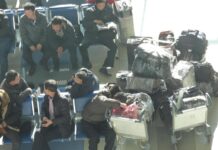[imText1]A key discussion of the North Korean Human Rights Bill began this afternoon at the Press Center in Seoul with opening speeches from key advocates of human rights in North Korea including the UN’s North Korea Human Rights Rapporteur Vitat Muntarbhorn, Chairwoman of North Korea Freedom Coalition Suzanne Scholte and Kim Young Il, the executive director of event organizer PSCORE and himself a defector.
Special Rapporteur Muntarbhorn, giving the keynote address, was strident in his criticism of North Korea, calling the situation there “harrowing” and “horrific on many fronts.” But, he said, “we must not despair” for we must “expose it to the world.”
“We must advocate,” he said, “fair treatment of all,” meaning North Korean citizens inside and defectors outside the country alike. He added that North Korea is “one big prison” which must be exposed to the world.
“It is incumbent upon the UN to act,” he concluded, “to heal, to support, to help” the world in the fight against North Korean human rights abuses.
Suzanne Scholte, in her address, said that while the situation is still terrible, she is pleased that “the world knows” about the human rights situation in North Korea.
Scholte, looking forward, thanked the endless hard work of defector NGOs, calling them the future leaders of North Korea and urging national governments and others to invest more in their efforts to bring about change.
She said she hopes the ongoing North Korea Freedom Week can represent a real driving force for the South Korean political elite to finally pass the North Korean Human Rights Bill, to put South Korea at the forefront of the fight for North Korean human rights
Meanwhile, Kim Young Il, giving his opening address, called North Korea Freedom Week an “opportunity for suffering North Koreans to know we are on their side.”
Hyun Byung Chul, the current chair of the National Human Rights Commission who also gave a congratulatory address, called for the push for North Korean human rights to go beyond politics, as it sometimes does in South Korea. “We should not let the issue be used by political campaigns and political groups,” he said. Instead, he asserted, it is time to “focus on finding solutions.”
“The North Korean human rights situation goes beyond the political: it is universal,” he added.
Hwang Woo Yui, a South Korean lawmaker, calling the situation “very bleak,” concluded, “How long will we be able to ignore this? If we ignore this any further, it will be tantamount to the government giving up its role.”
The event continues now with a review of human rights conditions in North Korea and how the North Korean Human Rights bill can be used by NGOs in their work.

















